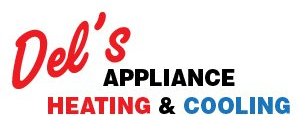10905 Hickman Mills Dr, Kansas City, MO 64137
2 Locations To Serve You!
56 E Main St. Adrian, MO 64720

Del's Appliance Heating & Cooling
Frequently Asked Questions - HVAC 101
FAQs
- SHOULD I REPAIR OR REPLACE MY EXISTING SYSTEM?
If your system is 10 to 12 years old or you start having frequent issues it may be time to replace it.
- HOW MUCH CAN I SAVE WITH NEW EQUIPMENT?
Air conditioning and heating equipment consume about 44% of a home's energy bill. Today's ENERGY STAR qualified systems are as much as 60% more efficient than 10-year-old equipment.
- IS INSTALLING A CENTRAL HVAC SYSTEM REALLY NECESSARY?
In new homes or remodels, a central home comfort system is the best solution for overall comfort and superior indoor air quality.
- WHAT IS THE BEST THERMOSTAT TO USE WITH MY SYSTEM?
Look for a programmable thermostat for accurate, reliable, energy-saving performance. For added convenience, a WiFi Capable thermostat may be your best option. It is best to discuss these options with your technician.
- HOW DO I SELECT THE RIGHT HEATING/COOLING SYSTEM?
Get solid advice from an expert. Have a technician out to analyze your current system to see if it meets the necessary requirements for the space in your home.
- IF I HAVE AN EXISTING SYSTEM, CAN ANY OF THE COMPONENTS BE REUSED?
Every system is different. After a thorough inspection of your components, your contractor will provide a rundown of what you need to replace and what you can keep.
- HOW COMPLICATED IS A NEW SYSTEM INSTALLATION?
That depends on the house and the system. While air conditioners and gas furnaces require different components, the common denominator is ductwork, which must be properly sized and zoned for proper system performance. Your contractor can evaluate your existing setup and tell you how simple your installation will be.
- WHAT DOES THE AIR HANDLER DO FOR MY SYSTEM?
An air handler is most often used in conjunction with a heat pump. The heat pump uses refrigeration to draw warm air from outside and distribute through the air handler into the home when it is cold outside. It is supplemented with electric heat when it is really cold. When it is warm outside, the heat pump carries the warm air from inside the home and draws it outside. This process is done through thermal transfer.
- WHAT CAN I DO TO IMPROVE INDOOR AIR QUALITY?
Indoor air can be from five to 100 times more polluted than outdoor air. Adding humidifiers, dehumidifiers, ventilation systems, UV lights, air scrubbers, and air ionizer technologies can dramatically improve your indoor air quality.
Call Us At Either Of Our Amazing Locations!
10905 Hickman Mills Drive | Kansas City, MO 64137
Monday - Friday: 8:00am - 5:00pm
Saturday & Sunday: Closed
10905 Hickman Mills Drive
Kansas City, MO 64137
Monday - Friday: 8:00am - 5:00pm
Saturday & Sunday: Closed
All Rights Reserved | Del's Appliance Heating & Cooling | Built and Powered by Summit Media Solutions | Site Map